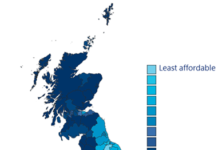PLANS to offer tax breaks to pensioners looking to downsize their homes, have been welcomed by a leading property group.
The National Association of Property Buyers (NAPB) said proposals could help to free up the market at a time where supply is fast becoming an issue.
Jonathan Rolande, from the NAPB, said: “We’d welcome a stamp duty cut for pensioners selling their own home to downsize. It would allow them to move without the penalty of high SDLT and would certainly encourage more to do so. Currently a pensioner selling a family home at £700,000 to buy at £500,000 would face a £15,000 stamp duty bill and with other costs such as estate agent and solicitors a move downward is going to cost them nearly £30,000 – a figure many simply cannot bring themselves to pay when leaving a much loved family home. Government receipts from stamp duty have more than doubled in the last ten years so there is certainly capacity to offer targeted reductions to help free up stock.”
Mr Rolande’s comments come days after the plans for a stamp duty cut were first revealed.
New proposals could also see buy-to-let landlords given incentives, such as lower capital gains tax, to sell their second homes to first-time buyers.
However Mr Rolande said this measure could backfire:
“We strongly disagree with any plan to reduce taxes for landlords who sell to first time buyers,” he added.
“The last thing we need right now is fewer properties to let, penalising those not in a position to buy their home. If tax breaks for wealthy landlords are on the table, why not use them to incentivise those who let their property on longer term agreements, giving more security to hard pressed tenants? We’re very glad that the government is looking at measures to repair parts of the broken property market but I am fearful that ill-considered action to solve one problem here will create another issue elsewhere.”
Rising numbers of young people are struggling to get their foot on the property ladder and prices are still rising.
Yet, at the same time, almost four in ten properties are officially ‘under-occupied’, meaning they have too many bedrooms for those living there, and could be more effectively used by families with children.
The new ideas follow Housing Secretary Michael Gove’s decision to ditch most of the Government’s changes to the planning system in England.
These would have forced councils to ensure a certain number of homes were built but sparked a backlash in the Tory shires.
Last November a minister said he wanted to encourage elderly people ‘rattling around’ in houses too big for them to downsize.
No stamp duty is paid on the first £125,000 of a house’s value, 2 per cent on the proportion up to £250,000, 5 per cent on the amount up to £925,000, with higher rates thereafter.
The average price of a home in Britain is £367,501, a record high for the fourth month in a row as demand soars after the pandemic, said website Rightmove.
According to their data, the number of buyers contacting estate agents is 14% down on the stamp-duty holiday-fuelled market of this time last year, but is still up by 31% compared with the more ‘normal’ pre-pandemic market of 2019. The number of properties available to buy is 55% down on the levels seen in 2019, meaning that supply and demand look likely to remain out of kilter for at least the rest of the year. The number of sales agreed is up by 12% in the year to date compared to 2019 even with restricted choice, though is down 17% compared with the ‘exceptional’ market of the same period last year.
“The market is yet to fully reflect the various pressures that will be put upon it in the next few months – higher interest rates, cost of living increases and more rigorous affordability checks by lenders will all have an effect,” Mr Rolande said.
“However, there is still very solid demand from buyers and of course the now long-term issue around shortage of supply. Coupled with good employment numbers and the aspiration of many to own their own home, it is possible that the market will slow without the freefall in prices predicted by many.
“Some targeted government intervention to guide the market to where it should be is crucial to unlocking supply and helping those who need it most.”

| [donate]
| Help keep news FREE for our readersSupporting your local community newspaper/online news outlet is crucial now more than ever. If you believe in independent journalism,then consider making a valuable contribution by making a one-time or monthly donation. We operate in rural areas where providing unbiased news can be challenging. |



















